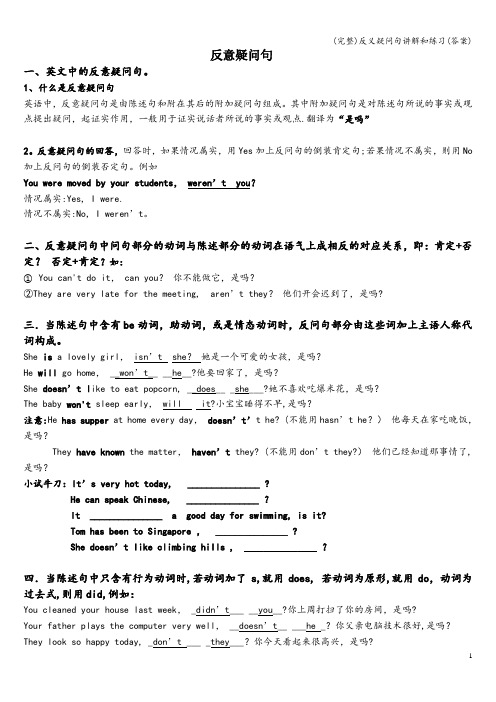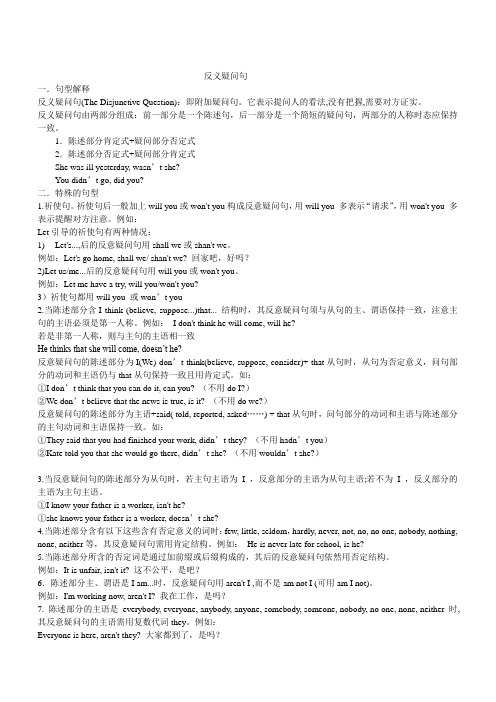反义疑问句的用法总结与练习
反义疑问句的用法和练习

反义疑问句的用法和练习一、反意疑问句的意义及其构成反意疑问句又叫附加疑问句,是指当提问的人对前面所叙述的事实不敢肯定,而需要向对方加以证实时所提出的问句。
其结构为:前一部分是一个陈述句,后一部分是一个简单的问句。
完成后一部分简单问句时,要根据前面陈述句的动词时态和人称来选择适当的助动词进行提问,前后两部分的人称和动词时态要保持一致。
如果前一部分用肯定式,后一部分一般用否定式;反之,前一部分为否定式,后一部分要用肯定式,即“前肯定后否定,前否定后肯定”。
二、简单句式结构中反意疑问句的运用反意疑问句运用于简单句式结构中时,我们应注意掌握以下几个方面1、当陈述句部分的主语是名词时,反意疑问句的主语必须用人称代词来代替。
例Your brother has gone to the library, hasn’t he? 你弟弟去图书馆了,是吗?2、当陈述句的主语是指示代词this, that时,反意疑问句的主语用it代替;指示代词是these, those时,反意疑问句的主语用they代替。
例That isn’t a useful book, is it? 那不是一本有用的书,是吗?These are important reading materials, aren’t they? 这些都是重要的阅读材料,是吗?3、当陈述句部分是I am…时,反意疑问句部分通常要用aren’t I;如陈述句部分的主语是I am not时,反意疑问句部分通常要用am I。
例I’m late for the meeting, aren’t I? 我开会迟到了,是吗?I’m not doing well, am I? 我干得不好,是吗?4、当陈述部分是everyone / everybody, someone / somebody, no one / nobody, none等表示人的不定代词时,反意疑问句部分的主语多用they,但也可用he;当陈述部分的主语是everything, anything, something, nothing等表示物的不定代词时,反意疑问句部分的主语用it。
反义疑问句句知识点+习题

反义疑问句一、学习反意疑问句,特别要注意的问题1)陈述部分的主语是this, that时,疑问部分的主语多用it;陈述部分的主语是these, those时,疑问部分的主语多用they如:This is a dictionary, isn’t it?Those are shelves, aren’t they?2)陈述句如果是there be结构时,疑问句部分仍用there。
如:There once was a man named Saint Nicholas, wasn’t there?3)在英语口语中,“I am +表语结构”,后面的反意疑问句多用aren’t I来体现。
如:I am very interested in learning English, aren’t I?4)陈述句的主语是动词不定式,动词的-ing形式或从句时,疑问部分的主语多用it来体现。
如:Taking care of our environment is very important, isn’t it?What he said is right, isn’t it?5)陈述句中含有not, no, hardly, neither, never, few, little, too …to等否定词或具有否定意义的词时,疑问部分常用肯定形式。
如:Few people knew the news, did they?Tom has never been to England , has he?但陈述句中如果带有否定意义的前缀和后缀的单词时,整个句子仍视为肯定句,反意疑问部分多用否定形式。
如:She is unhappy, isn’t she?6)陈述句的主语是nobody, no one, everyone, somebody等不定代词时,反意疑问部分的主语多用they (当强调全体时)或he(当强调个体时)。
如果陈述句的主语是something, nothing, anything, everything 等不定代词时,反意疑问部分的主语多用it。
反义疑问句的用法归纳及回答举例

反义疑问句的用法归纳及回答举例
1. 哎呀呀,反义疑问句就是在陈述句后面加上一个简短问句呀!比如“你喜欢看书,不是吗?”,这里就是先陈述“你喜欢看书”,然后问“不是吗”。
2. 咱要注意哦,如果前面陈述句是肯定的,后面的反义疑问句就要用否定形式呢。
就像“他很聪明,不是吗?”。
3. 反过来,如果前面是否定陈述句,那后面的反义疑问句就得是肯定的啦!比如“她今天没来,对吧?”。
4. 回答的时候可别糊涂呀!要是同意就说“是呀”或“对呀”,不同意就直接说“不是”。
就好像人家问“今天天气不错,不是吗?”,觉得对就说“是呀”。
5. 有时还会遇到特殊情况呢,像“Let's go shopping,shall we?”这时候就得用“shall we”呀。
6. 还有那种祈使句的反义疑问句呢,“别跑太快,好吗?”就是一种呀。
7. 哎呀,这反义疑问句用法不复杂吧,一学就会啦!就像学骑自行车,掌握了技巧就没问题啦!
8. 记住这些要点,以后再遇到反义疑问句就不怕啦!反义疑问句其实挺好玩的呀,能让我们的交流更有趣不是吗?我觉得掌握反义疑问句真的很有用,能让我们的表达更丰富呢。
反义疑问句的用法归纳及习题

反意疑问句【反意疑问句】(一)概念:反意疑问句就是由陈述句与附在其后得附加疑问句组成。
其中附加疑问句就是对陈述句所说得事实或观点提出疑问,起证实作用,一般用于证实说话者所说得事实或观点。
(二)要点注意:1.反意疑问句前后两部分谓语应就是:“肯定陈述+否定疑问”或“否定陈述+肯定疑问”。
2.简略问句如果就是否定式:not应与be,do,will等系动词、助动词、情态动词缩写。
3.简略问句得主语不用名词,应用人称代词。
4.陈述部分含“too、、、to”时,就是否定句。
(三)用法:1) 陈述部分I am时,疑问部分要用aren't I、I'm as tall as your sister,aren't I?(我与您姐姐一样高,对吗?)2) 陈述部分用no, nothing, nobody, never, few, little, seldom, rarely,hardly等否定含义得词时,疑问部分用肯定含义。
如: The old man made no answer, did he?Jim is never late for school, is he?3) 陈述部分有情态动词have to +v、(had to + v、),疑问部分常用don't +主语(didn't +主语)。
We have to get there at eight tomorrow, don't we?used to,疑问部分用didn't +主语或usedn't +主语。
He used to take pictures there, didn't he? / usedn't he?had better(最好) + v、疑问句部分用hadn't you?You'd better read it by yourself, hadn't you?4) 陈述部分有would rather(宁可、宁愿) +v、,疑问部分多用wouldn't +主语。
反义疑问句的用法归纳及习题

反义疑问句的用法归纳及习题反义疑问句是英语语法中的常用句型之一,它由一个肯定或否定的陈述句和一个所加的疑问句构成。
通过反义疑问句的使用,我们可以在表达思想观点时增强语气,提出问题的同时向对方确认自己的观点。
本文将介绍反义疑问句的用法,并提供相应的习题供读者进行练习。
一、反义疑问句的构成反义疑问句由两个部分组成:一个陈述句和一个疑问句。
陈述句通常是一个完整的句子,而疑问句则是一个简化的疑问句。
1. 如果陈述句是肯定句,则疑问句部分用否定形式;例如:- They are from China, aren't they?- You can swim, can't you?2. 如果陈述句是否定句,则疑问句部分用肯定形式;例如:- He doesn't like coffee, does he?- They haven't arrived yet, have they?二、反义疑问句的用法1. 确认对方的观点或陈述:当说话人对对方的陈述持怀疑态度时,可以使用反义疑问句来进行确认。
例如:- You haven't seen the movie, have you?- You don't like ice cream, do you?2. 请求对方的帮助或征求对方的意见:当说话人需要对方给予回应或意见时,可以使用反义疑问句来婉转地提出请求。
例如:- It's a beautiful day, isn't it? (期待对方赞同这个说法)- This problem is difficult, isn't it? (希望对方给予帮助或建议)3. 表达自己的观点或感受:反义疑问句也可以用来表达自己的观点或感受,并期待对方与自己保持一致或不一致。
例如:- She is a talented singer, isn't she?- You're not feeling well, are you?三、习题练习以下是一些习题,供读者练习反义疑问句的用法。
反义疑问句讲解与练习

反义疑问句讲解与练习一、含be(is, are, was, were)动词的反意疑问句(1)句型1:主语+ be+其它,isn’t(aren’t, wasn’t, weren’t)+ 主语?句型2:主语+ be not+其它,is(are, was, were) + 主语?① You are from America, aren’t you? Yes, I am. No, I’m not.② It isn’t very cold today, is it? Yes, it is. No,it isn’t.(2)注意:There be句型例:There is an old picture on the wall, isn’t there?二、带行为动词反意疑问句(不含be和情态动词)句型1:主语+动词+其他,do/did/does + not +主语?句型2:主语+did/does/do+not +动词原形+其他,did/do/does+其他?例:You often watch TV in the evening, don’t you? Yes, I do. No, I don’t.三、含有情态动词的反意疑问句,反义疑问句中的动词使用情态动词。
例:The students must study hard, mustn’t they? Yes, they must. No, they needn’t.注意:You must go home now, needn’t you? Yes, I must. No, I needn’t.★注意:There be句型的一般将来时① There will be a basketball match tomorrow, won’t there?Yes, there will. No, there won’t.② There won’t be too much pollution in the future, will there?Yes, there will. No, there won’t.四、反义疑问句的回答:答语要和实际情况相符合,遵循“实事求是”的原则。
(完整)反义疑问句讲解和练习(答案)

反意疑问句一、英文中的反意疑问句。
1、什么是反意疑问句英语中,反意疑问句是由陈述句和附在其后的附加疑问句组成。
其中附加疑问句是对陈述句所说的事实或观点提出疑问,起证实作用,一般用于证实说话者所说的事实或观点.翻译为“是吗”2。
反意疑问句的回答,回答时,如果情况属实,用Yes加上反问句的倒装肯定句;若果情况不属实,则用No 加上反问句的倒装否定句。
例如You were moved by your students,weren’t you?情况属实:Yes, I were.情况不属实:No, I weren’t。
二、反意疑问句中问句部分的动词与陈述部分的动词在语气上成相反的对应关系,即:肯定+否定?否定+肯定?如:①You can't do it, can you?你不能做它,是吗?②They are very late for the meeting, aren’t they?他们开会迟到了,是吗?三.当陈述句中含有be动词,助动词,或是情态动词时,反问句部分由这些词加上主语人称代词构成。
She is a lovely girl,isn’t she?她是一个可爱的女孩,是吗?He will go home, __won’t__ __he__?他要回家了,是吗?She doesn’t l ike to eat popcorn, __does__ _she___?她不喜欢吃爆米花,是吗?The baby won't sleep early, will it?小宝宝睡得不早,是吗?注意:He has supper at home every day,doesn’t’t he? (不能用hasn’t he?)他每天在家吃晚饭,是吗?They have known the matter,haven’t they? (不能用don’t they?)他们已经知道那事情了,是吗?小试牛刀:It’s very hot today, _______________ ?He can speak Chinese, _______________ ?It _______________ a good day for swimming, is it?Tom has been to Singapore , _______________ ?She do esn’t like climbing hills , _______________ ?四.当陈述句中只含有行为动词时,若动词加了s,就用does, 若动词为原形,就用do,动词为过去式,则用did,例如:You cleaned your house last week, _didn’t___ __you__?你上周打扫了你的房间,是吗?Your father plays the computer very well, __doesn’t__ ___he _?你父亲电脑技术很好,是吗?They look so happy today, _don’t ___ _they___?你今天看起来很高兴,是吗?小试牛刀: Meimei studies in a middle school, _______________ ?He loves cold weather , _______________ ?You finished the task yesterday, _______________ ?五.反意疑问句的陈述部分带有little, few, never, hardly, seldom,nobody, nothing,barely, scarcely等否定意义的词时,问句部分用肯定式.如:①She never tells a lie, does she?(不用doesn’t she?)她从不说谎,是吗?②He was seldom late, was he?(不用wasn’t he?) 他几乎不迟到,是吗?小试牛刀:Few students can answer the question, _______________ ?He can hardly finish his homework, _______________ ?六、反意疑问句的陈述部分为I am……时,问句部分习惯上用aren’t I?表示.如:I am a very honest man, aren’t I? 我是个很诚实的人,是吗?小试牛刀:I’m in Class 3,Grade 2, _______________ ?I’m ten years old, _______________ ?七.陈述部分的主语为不定代词something, anything, nothing, everything时,问句部分的主语用it。
(完整版)反义疑问句详细讲解及习题及答案

反义疑问句一.句型解释反义疑问句(The Disjunctive Question):即附加疑问句。
它表示提问人的看法,没有把握,需要对方证实。
反义疑问句由两部分组成:前一部分是一个陈述句,后一部分是一个简短的疑问句,两部分的人称时态应保持一致。
1.陈述部分肯定式+疑问部分否定式2.陈述部分否定式+疑问部分肯定式She was ill yesterday, wasn’t she?You didn’t go, did you?二.特殊的句型1.祈使句。
祈使句后一般加上will you或won't you构成反意疑问句,用will you 多表示“请求”,用won't you 多表示提醒对方注意。
例如:Let引导的祈使句有两种情况:1) Let's...,后的反意疑问句用shall we或shan't we。
例如:Let's go home, shall we/ shan't we? 回家吧,好吗?2)Let us/me...后的反意疑问句用will you或won't you。
例如:Let me have a try, will you/won't you?3)祈使句都用will you 或won’t you2.当陈述部分含I think (believe, suppose...)that... 结构时,其反意疑问句须与从句的主、谓语保持一致,注意主句的主语必须是第一人称。
例如:I don't think he will come, will he?若是非第一人称,则与主句的主语相一致He thinks that she will come, doesn’t he?反意疑问句的陈述部分为I(We) don’t think(believe, suppose, consider)+ that从句时,从句为否定意义,问句部分的动词和主语仍与that从句保持一致且用肯定式。
- 1、下载文档前请自行甄别文档内容的完整性,平台不提供额外的编辑、内容补充、找答案等附加服务。
- 2、"仅部分预览"的文档,不可在线预览部分如存在完整性等问题,可反馈申请退款(可完整预览的文档不适用该条件!)。
- 3、如文档侵犯您的权益,请联系客服反馈,我们会尽快为您处理(人工客服工作时间:9:00-18:30)。
反意疑问句的用法总结:1) 陈述部分的主语是I,疑问部分要用aren't I.I'm as tall as your sister,aren't I?2) 陈述部分的谓语是wish,疑问部分要用may +主语。
I wish to have a word with you, may I?3) 陈述部分用no, nothing, nobody, never, few, seldom, hardly, rarely, little等否定含义的词时,疑问部分用肯定含义。
The Swede made no answer, did he / she?Some plants never blown (开花), do they ?4) 含有ought to 的反意疑问句,陈述部分是肯定的,疑问部分用shouldn't / oughtn't +主语。
He ought to know what to do, oughtn't he? / shouldn't he?5) 陈述部分有have to +v. (had to + v.),疑问部分常用don't +主语(didn't +主语)。
We have to get there at eight tomorrow, don't we?6) 陈述部分的谓语是used to 时,疑问部分用didn't +主语或usedn't +主语。
He used to take pictures there, didn't he? / usedn't he?7) 陈述部分有had better + v. 疑问句部分用hadn't you?You'd better read it by yourself, hadn't you?8) 陈述部分有would rather +v.,疑问部分多用wouldn't +主语。
He would rather read it ten times than recite it, wouldn't he?9) 陈述部分有You'd like to +v. 疑问部分用wouldn't +主语。
You'd like to go with me, wouldn't you?10) 陈述部分有must 的疑问句,疑问部分根据实际情况而定。
He must be a doctor, isn't he?You must have studied English for three years, haven't you? / didn't you? He must have finished it yesterday, didn't he?11) 感叹句中,疑问部分用be +主语。
What colours, aren't they?What a smell, isn't it?12) 陈述部分由neither… nor, either… or 连接的并列主语时,疑问部分根据其实际逻辑意义而定。
Neither you nor I am engineer, are we?13) 陈述部分主语是指示代词或不定代词everything, that, nothing, this, 疑问部分主语用it。
Everything is ready, isn't it?14) 陈述部分为主语从句或并列复合句,疑问部分有三种情况:a. 并列复合句疑问部分,谓语动词根据邻近从句的谓语而定。
Mr. Smith had been to Beijing for several times, he should have been in China now, shouldn't he?b. 带有定语从句,宾语从句的主从复合句,疑问部分谓语根据主句的谓语而定:He is not the man who gave us a talk, is he?He said he wanted to visit Japan, didn't he?c. 上述部分主句谓语是think, believe, expect, suppose, imagine等引导的定语从句,疑问部分与宾语从句相对应构成反意疑问句。
I don't think he is bright, is he?We believe she can do it better, can't she?15) 陈述部分主语是不定代词everybody, anyone, somebody, nobody, no one 等,疑问部分常用复数they,有时也用单数he。
Everyone knows the answer, don't they? (does he?)Nobody knows about it, do they? (does he?)16) 带情态动词dare或need的反意疑问句,疑问部分常用need (dare ) +主语。
We need not do it again, need we ?He dare not say so, dare you?当dare, need 为实义动词时,疑问部分用助动词do + 主语。
She doesn't dare to go home alone, does she?17) 省去主语的祈使句的反意疑问句,疑问部分用will you。
Don't do that again, will you?Go with me, will you / won't you ?注意:Let's 开头的祈使句,后用shall we?Let us 开头的祈使句,后用will you?Let's go and listen to the music, shall we?Let us wait for you in the reading-room, will you ?18) 陈述部分是"there be"结构的,疑问部分用there省略主语代词。
There is something wrong with your watch, isn't there?There will not be any trouble, will there?19) 否定前缀不能视为否定词,其反意疑问句仍用否定形式。
It is impossible, isn't it?He is not unkind to his classmates, is he?20) must在表"推测"时,根据其推测的情况来确定反意疑问句。
He must be there now, isn't he?It must be going to rain tomorrow, won't it?快速记忆表陈述部分的谓语疑问部分I aren't IWish may +主语no,nothing,nobody,never,few, seldom, hardly, 肯定含义rarely, little等否定含义的词ought to(肯定的)shouldn't/ oughtn't +主语have to+v.(had to+v.) don't +主语(didn't +主语) used to didn't +主语或usedn't +主语had better + v. hadn't youwould rather + v. wouldn't +主语you'd like to + v. wouldn't +主语must 根据实际情况而定感叹句中be +主语Neither…nor,either…or 连接的根据其实际逻辑意义而定并列主语指示代词或不定代词everything,that, 主语用itnothing,this并列复合句谓语根据邻近从句的谓语而定定语从句,宾语从句的主从复合句根据主句的谓语而定think,believe,expect,suppose,imagine等引导与宾语从句相对应的从句everybody,anyone,somebody,nobody,no one 复数they, 单数he情态动词dare或need need (dare ) +主语dare, need 为实义动词do +主语省去主语的祈使句will you?Let's 开头的祈使句Shall we?Let us 开头的祈使句Will you?there be 相应的谓语动词+there(省略主语代词)否定前缀不能视为否定词仍用否定形式must表"推测" 根据其推测的情况来确定反意疑问句精选练习:1. The movie that we saw last week was quite interesting, ______?a. wasn’t itb. was itc. didn’t wed. weren’t we2. Tom has been writing letters all afternoon, but he should have finished them by now,______?a. hasn’t heb. has hec. shouldn’t hed. didn’t you3. David told me that you would take a trip to America, ______?a. would youb. wouldn’t youc. did youd. didn’t you6. Any one can join the club, ______?a. can any oneb. can’t any onec. can’t theyd. can they7. Tell me how to operate the electronic computer, ______?a. will youb. shan’t youc. do youd. don’t you8. May scarcely comes to visit you on Christmas Day, ______?a. doesn’t sheb. does shec. do youd. don’t you9. Let’s listen to the radio program that the teache r mentioned, ______?a. do web. don’t wec. shall wed. shan’t we填词完成反意疑问句1. He wouldn't wait in line the next day ,______ ?2. She has been learning English , _________ ?3. We can't take the books out ,________ ?4. He has to go home on foot , ________ ?5. You haven't had your lunch ________ ?6.We have nothing to eat , ________ ?7.They dislike the book ,________ ?8. There used to be a post office in the street ,________ ?10.We must hand in the exercises , ________ ?11.You dare to jump off the wall ,________ ?12. He made a few mistakes in his exercises , ________ ?13 She must be a music lover ,________ ?15. I don't think you 're serious , ________ ?16.Let us do the jobs by ourselves ,________ ?18. Do the homework by yourselves , ________ ?19 Let's enter the hall ,________ ?20 .You must have seen him yesterday ,________ ?答案1. would he2.hasn't she3.can we4.doesn't he5.have you6.have we7.don't they8. usedn't there9.didn't he 10.mustn't we 11.don' t you 12.didn't he 13.isn't she 14.don't you 15.are you 16.will you 17.Yes 18.will you 19.will you 20.didn't。
